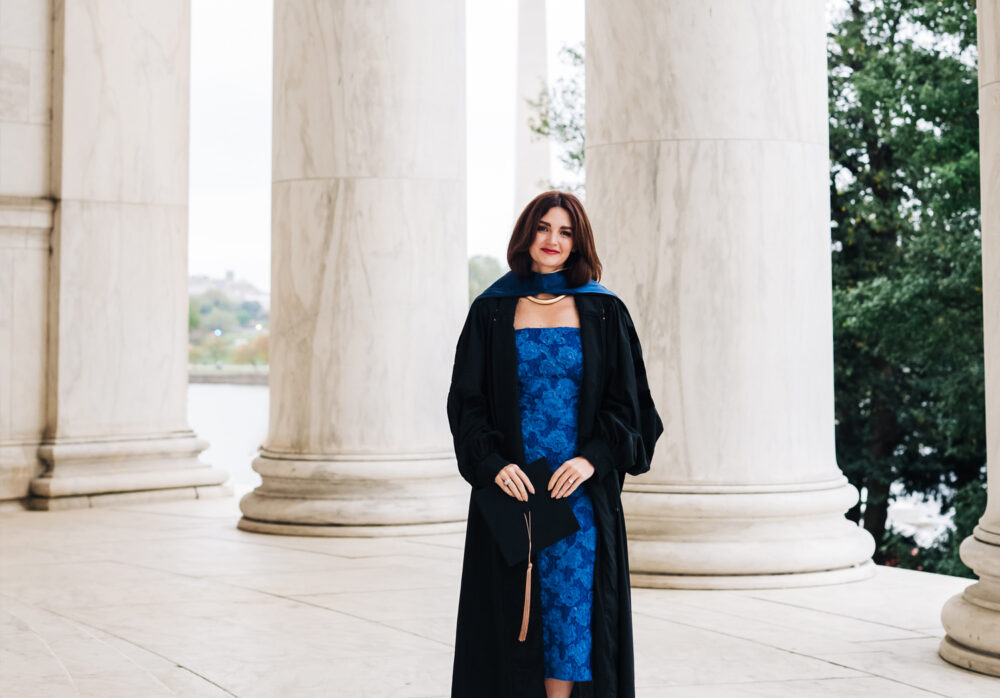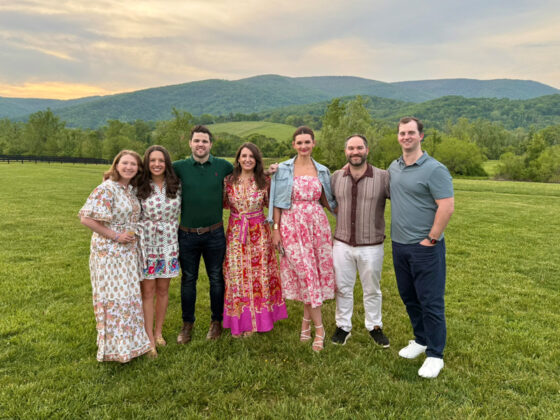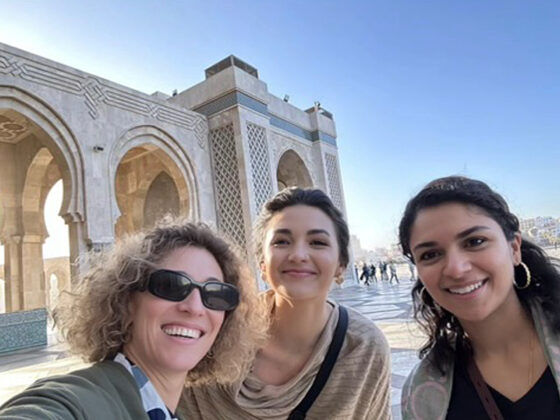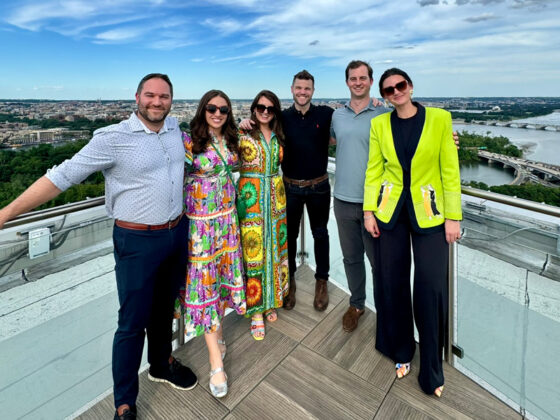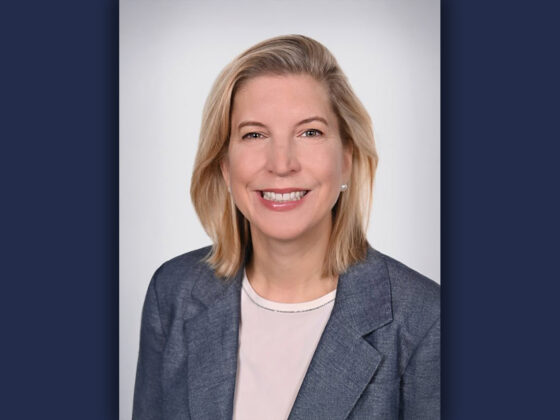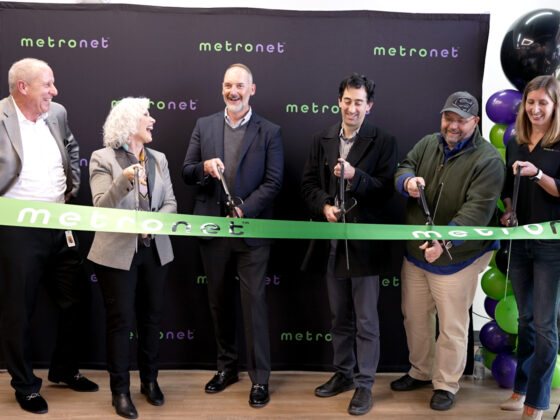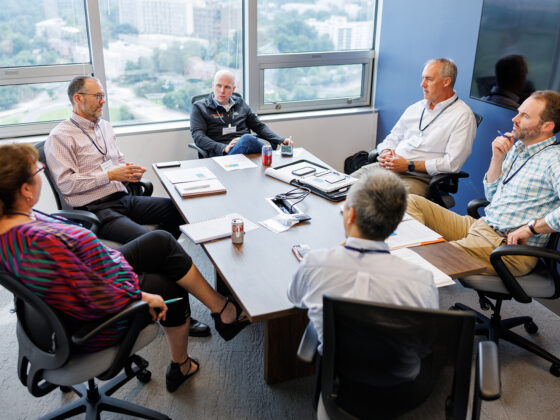Rachel Folmar (TEP ’23, EMBA ’25) is celebrating her second major milestone at Darden, graduating as part of the Class of 2025 with her Executive MBA. She first came to Darden in October 2022 to participate in The Executive Program (TEP), Executive Education & Lifelong Learning’s comprehensive advanced management program for top leaders.
Her journey embodies the spirit of resilience, dedication and the transformative power of a Darden education. Navigating significant adversity and change, including homelessness in high school, becoming a young mother and juggling various jobs, Rachel forged a successful and rewarding career, ultimately becoming Director of HR at U.S. Silica Company. Her story took a pivotal turn when, encouraged by her boss, Lynnette Crowder (EMBA ’10), she applied for The Executive Program, despite not having an undergraduate degree. This experience not only validated her capabilities but also inspired her to pursue an Executive MBA at Darden, where her unique perspective was highly valued. In a recent interview, Rachel shared the profound impact of her Darden experience.
How has your Darden Executive MBA experience impacted your life overall?
The first word that came to mind was transformative—and while that might sound cliché, it’s absolutely true. The Darden EMBA impacted every area of my life in a holistic way. It transformed the way I think, not just in the workplace, but also in my personal life.
I’ve developed lifelong friendships and built a vast network. I’ve also grown to love both D.C. and Charlottesville deeply. It’s honestly been one of the most significant shifts in my mindset that I’ve ever experienced.
What part of the program really stood out in helping you grow professionally?
The case method had a huge impact on me. It taught me to ask better questions and, more importantly, to listen more. When I first started, I was so focused on getting the “right” answer. But Darden shifted that mindset. It became less about always being right and more about engaging deeply with complex problems and collaborating with others to solve them.
This change in approach has made me more thoughtful and confident in decision-making at work. I’ve learned that sometimes the best leadership comes from asking the right questions rather than having all the answers.
How has the Darden experience impacted you on a personal level?
I no longer have imposter syndrome. I feel well prepared, and it’s renewed my sense of ambition and clarity about my aspirations. Also, I appreciated the different leadership styles from the professors. They were all very unique and all very different. But they all worked. And so that’s inspired me to think, what’s my style? What’s authentic to me? What’s my personal brand? It’s been very impactful across the board.
My favorite professors that I had the best experiences with were Venkat and Sean Martin. They were both incredible, the way they could shape the conversation, their storytelling abilities and just move the emotions of the room. The biggest thing I walked away with from those professors was the importance of ethical leadership. We are either the leaders or the future leaders, and it’s our responsibility to shape the next generation, shape the country and shape the world with whatever we do with our lives.
How have you been able to apply what you’ve learned in your role at U.S. Silica?
First and foremost, it’s really the immediate and more tangible impact of my Darden experience altogether – TEP and the EMBA program. The strategy behind the programs have certainly reflected now in my role. I tend to think of things with more of a holistic view. As an HR professional, I don’t often think about market dynamics, competitive advantages and the business strategy. And that’s been a huge impact for me. My role now includes understanding the business strategy, as the leaders in my company are my customers. And those perspectives have helped me lead and influence my team to have that same mindset. The discussions around organizational behavior and leadership have definitely influenced how I lead my team.
How crucial were the learning teams to your experience, and what made them so impactful?
I think the impact and the power of the learning teams is absolutely incredible. It shows the thoughtful approach by Darden to assign those teams and to ensure that they’re putting a diverse team together to work together and to have a safe space to ask stupid questions. We had an immediate connection. In the first year we would meet weekly and talk nearly daily. I’m not sure how I would have survived without them. We certainly challenged each other’s assumptions. We celebrated successes. There were marriages, there were new babies — it was incredible. We’ve become lifelong friends.
How did the global residencies shape your perspective and contribute to your overall Darden experience?
You obviously learn a lot about the business practices in whatever country it is that you’re visiting. You get this experience and this global perspective that you can’t get in a classroom from a textbook or from watching a video. You are just immersed in this country, and it was completely eye opening. It challenged my assumptions and my worldview.
Vietnam was one of the most impactful residencies that I had, because, as Americans, we just have this different sense of what Southeast Asia looks like, acts like, and their place in the world and the global economy. And so much of that was challenged for me just by visiting there and understanding more and meeting with different businesses. So, I think the global residencies were like the cherry on top of the whole Darden experience. You get this global perspective that you learn in your coursework and in your conversations during case studies. But once you go and you experience it firsthand, and you tie it back to what you’ve learned in the classroom, it’s just incredible.
How do you plan to stay connected with the Darden community?
One of the things I told Yael (Grushka-Cockayne) recently was, I’m just not done with Darden. From a formal education perspective, I’m definitely going to take a break. But I just don’t see myself not having a relationship with the Darden community and with anybody tied to Darden. I hope that I can participate in alumni events — I know that there’s opportunities here locally in Houston where I can participate. I would love to serve as a guest speaker or be on future panels. I would love to assist anybody about to start their EMBA journey or TEP. Darden has significantly impacted my life, and I would love to give that back to somebody else. I will do everything I can to stay engaged with the network and Darden as a whole.
What’s next for you?
In the immediate future at U.S. Silica, I’m excited to continue to apply the strategic insights and leadership skills that I’ve gained from Darden. I’m also eager to take on more complex challenges and contribute to the company’s continued growth and success.
Looking further ahead, Darden has helped me set new goals and aspirations. It’s broadened my perspective on what’s possible. While I’m deeply committed to my current role, I’m exploring opportunities for increased leadership responsibility and potentially venturing into new areas where I can really leverage that new skill set. So Dardan has empowered me to think more strategically about my own long term career trajectory, and to pursue opportunities that align with my values and my aspirations, to make a larger impact.
What’s the next step for your career? Darden offers learning opportunities to meet every need, from degree programs to lifelong learning programs and certificates, as well as development solutions for organizations.

